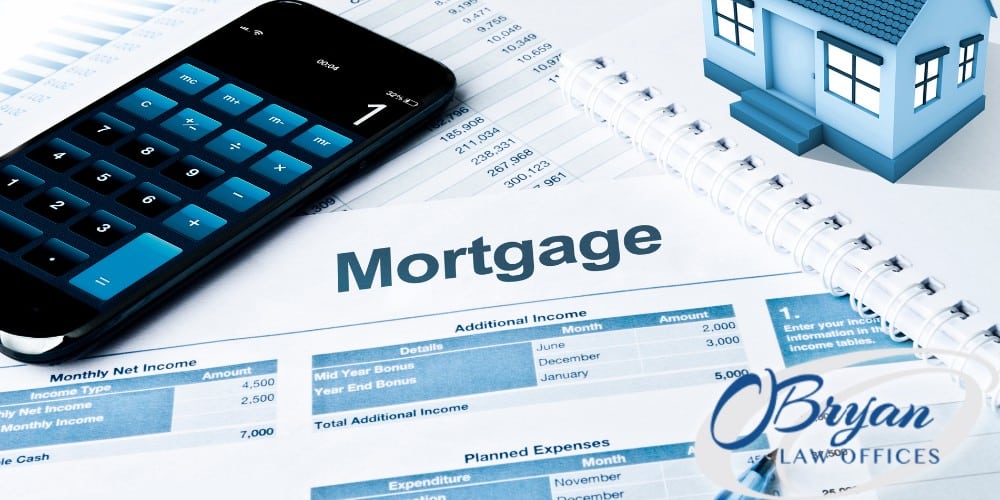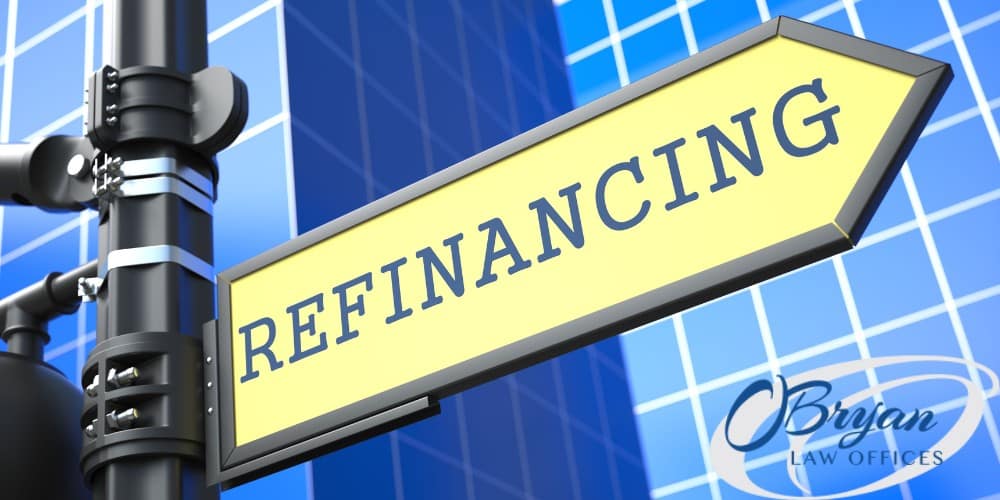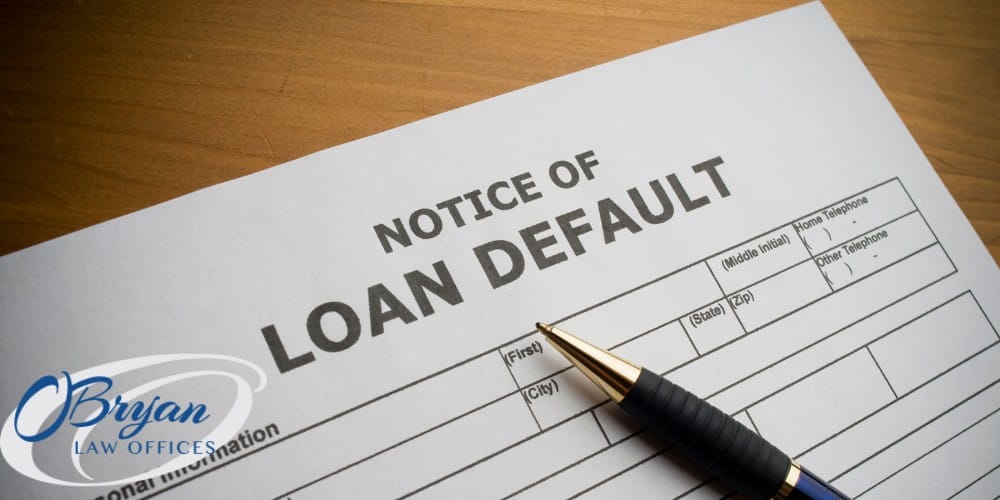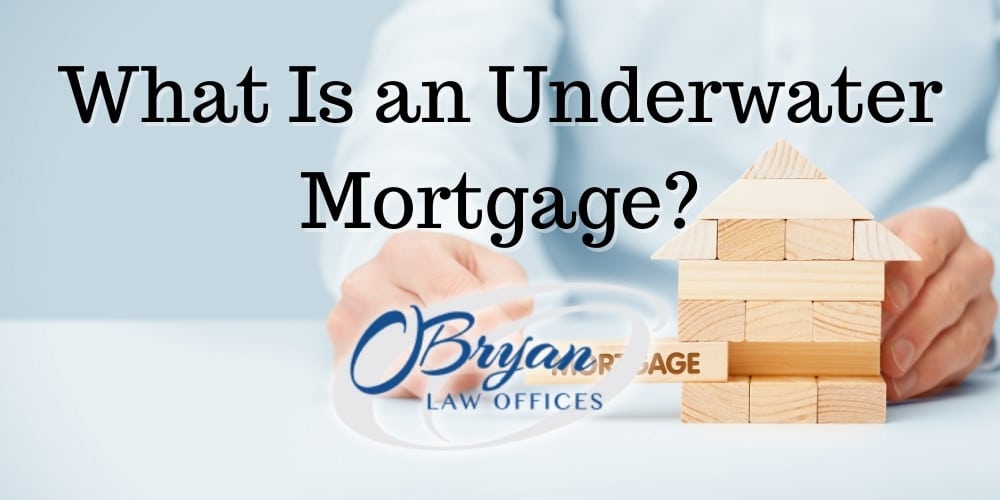If you’ve ever heard the term “underwater mortgage,” you may wonder how this term differs from a regular mortgage. What does it mean to have an underwater mortgage and how can you avoid having one? If you’re struggling to pay your mortgage, we strongly recommend working with a law firm that has experience delaying or preventing foreclosures. Working with a law firm, rather than a debt relief company, will guarantee you legal protection.
At O’Bryan Law Offices, we believe in the power of bankruptcy protection as a tool to regain control of your finances. Filing for bankruptcy gives you the protection of the automatic stay, which can be crucial for saving your home. To schedule a free consultation with a compassionate, seasoned Kentucky bankruptcy lawyer, call 502-339-0222 today.
What Does It Mean to Be Underwater on Your Mortgage?
Also known as an upside-down mortgage, an underwater mortgage occurs if the principle of your mortgage is more than the home is worth. This tends to happen when property values fall sharply after someone has purchased a home. Even though their home isn’t worth as much now, they must still pay the originally agreed-upon price for it.
Mortgages aren’t the only loan types that can be underwater. Car loans, boat loans, and other major loans can also fall underwater. Additionally, your mortgage loan can fall underwater if you miss payments.
How Many Mortgages Are Underwater Today?
Currently, Kentucky is the eighth-highest state in terms of the percentage of underwater mortgages. The county with the highest percentage of underwater mortgage payments is Pike County at 26.7% as of 2020. Many homeowners today are still recovering from the housing crisis of 2008, and thus are well-acquainted with underwater mortgages.
Underwater Mortgage Example
Let’s say you purchased a home and paid $500,000. After a few years, the property value decreases to $420,000. You now owe the lender another $80,000 than what the home is currently worth. In other words, if you sold your house, all of your proceeds (plus another $80,000) would go to the lender. This is also referred to as having negative equity.
How to Figure Out if You Are Underwater on Your Mortgage

Maybe you’re unsure of whether or not you are actually underwater. In technical terms, your home is underwater when your unpaid principal balance is higher than the fair market value of your home. Take the following steps to determine whether or not your mortgage balance is underwater.
- Review your mortgage loan balance. You should be able to log in to your account or look at a recent mortgage statement to determine how much you owe. If you have another mortgage, add up these two balances to find your total.
- Find the current housing market value of your home. You can use online tools for an approximation, or you could pay to have an appraiser determine the home value.
How Does a Mortgage Become Underwater?
There are a few situations that can lead to having underwater mortgage payments. We’ve already explained what they are, but how do they happen? Sometimes, the situation is entirely out of your control. For example, maybe the housing market takes a big dip, causing home values to sink. Someone may end up owing more on their home than it’s worth in this situation.
This can also happen, however, if you get behind on your monthly mortgage payments. Missing monthly payments often results in fees, an increased accrual of interest, and a host of other problems. Unfortunately, difficult financial circumstances can lead to having trouble paying your existing mortgage.
What Are the Downsides of an Underwater Mortgage?
You may wonder what’s so bad about having negative equity in your home. Having an upside-down mortgage can lead to the following problems.
- If you want to sell your home, it would be much more difficult. When property values fall, demand tends to fall along with it.
- You cannot refinance your current loan if your mortgage is underwater. Lenders generally require you to have at least some equity in your home before you refinance.
- You may lose your home to foreclosure. The farther underwater someone is, the closer they get to foreclosure. If you cannot make payments to your mortgage lender, you will likely face the possibility of foreclosure.
Can You Refinance if Your House Is Underwater?

Generally, no. However, there are certain programs that can provide aid to someone whose mortgage is underwater. For example, if your principal balance is owned by Fannie Mae or Freddie Mac, you may qualify for the High Loan-to-Value Refinance option or the Freddie Mac Enhanced Relief Refinance.
Maybe you have an FHA loan instead. This would allow you to take advantage of the FHA Streamline Refinance. If you have a USDA loan balance, you may qualify for the USDA Streamline Assist Refinance. Those who are struggling with making on-time mortgage payments still have options, even if it feels like they don’t.
What Happens When You Owe More Than Your House Is Worth?
When the amount you owe on your mortgage exceeds the current market value of your home, this is referred to as an underwater mortgage. If you’re not planning to sell your home and you can pay your bills on time, this situation may not affect you. Many people try and succeed in waiting for the real estate world to rekindle, and for the market value of their home to increase.
The trouble begins when you try to sell your home, refinance your mortgage, or build equity. If you’re looking to avoid these problems, consider speaking with our Chapter 7 and Chapter 13 lawyers.
What Is a Strategic Default?

A strategic default occurs if a borrower purposefully stops making payments on their home loan. Defaulting can be a strategic move for those who have heavily weighed the costs and benefits of making payments versus defaulting. In simple terms, it’s one way that property owners can “cut their losses” when real estate values plummet. Those who are underwater on their home loan may choose to default rather than continuing to pay.
What Does Walking Away from a Mortgage Mean?
Walking away from one’s mortgage is simply another way of saying they strategically defaulted. They examined their personal finance situation and determined that it wasn’t worth it to continue paying their home loan. Underwater homeowners sometimes use this solution as a last resort.
Risks of Walking Away From an Underwater Mortgage
While a strategic default is technically a valid solution, we recommend thoroughly reviewing the risks that you face if you decide to walk away from an upside-down mortgage. Much like other financial decisions, your credit report will take a hit from a strategic default. Other potential consequences include the following.
- Your lender could still try to collect what you owe after the short sale. In a short sale, the homeowner will actually lose money since the home sold for less than the borrower’s remaining debt.
- Getting another mortgage loan will be more difficult. New lenders will see the voluntary foreclosures and strategic defaults on your credit report. Therefore, they’ll be much more skeptical of your ability to make payments on time. Fannie Mae and Freddie Mac also have a waiting period before you can apply for another mortgage after foreclosure.
- You may face potential tax consequences. Those who choose to default may find themselves receiving an IRS tax bill as a result. Consult with a trusted tax advisor to determine whether or not you’re at risk.
Options for an Underwater Mortgage
Borrowers may also choose to refinance their mortgage through the Home Affordable Refinance Program (HARP) or another underwater refinance program.
Stay in Your Home and Make Payments
If you’re not looking to sell your home at the moment, you could try to wait out the existing real estate slump. Property values fluctuate with time, so you may find that waiting a couple of years puts you in a very different position than you’re in now. Even a 5% increase in property values could bring thousands of homes out from underwater.
Try to Get a Principal Reduction
Many lenders will also consider giving you a reduction on your outstanding principal. They might do this in order to avoid an expensive foreclosure procedure. You could also take advantage of certain federal programs that support principal reductions.
Request a Loan Modification
You could also request a modification of the loan from your lender. While not all lenders will be open to this idea, some will, especially if you can prove financial hardship. Fannie Mae and Freddie Mac also have loan modification programs.
File for Bankruptcy

Last but not least, you could file for bankruptcy. This option is one of the only options available that provides actual legal protections to filers. Those who file bankruptcy receive the protection of the automatic stay, which is outlined in the federal Bankruptcy Code. Once the stay goes into effect, foreclosures cannot proceed, creditors can no longer harass you, and you have a chance to work toward a fresh financial future.
Contact a Kentucky Bankruptcy Lawyer Today
If you’re falling severely behind on your current mortgage, have missed payments, or are facing an acceleration clause in your mortgage, bankruptcy is a viable option for you. Many people view bankruptcy as a negative, last resort situation. However, it is actually a powerful tool that many people use to discharge and get rid of crushing debt. To learn more about how bankruptcy can help your financial situation, contact a Kentucky bankruptcy attorney with O’Bryan Law Offices. Either call our office at 502-339-0222 or submit an online intake form to schedule your free consultation with us. We can help you navigate the complicated process of bankruptcy and even counsel you on getting a mortgage after Chapter 13 discharge.








